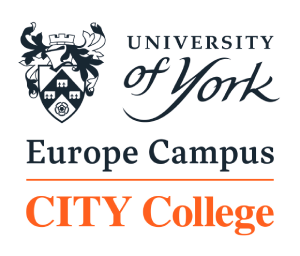News

Ms Maria-Araxi Sachpazian represents ESD at the International Conference on Language Education and Research
Ms Maria-Araxi Sachpazian, Lecturer at the English Studies Department of CITY College, University of York Europe Campus delivered a presentation at the 3rd International Conference on Language Education and Research, which was organised by the Applied Language Studies House and the Journal of Applied Languages and Linguistics and was carried out online from 1st to the 3rd October 2021. Ms Sachpazian presented her preliminary work on a research project entitled “Is this a forgotten hand: issues of learners’ cognitive engagement in Digital Learning Environments”. The presentation aimed to explore from a bibliographical perspective the reasons why learners of English in secondary and tertiary education failed to exploit digital learning environments during the online teaching made necessary by the pandemic and why their cognitive engagement left so much to be desired.
18/10/2021
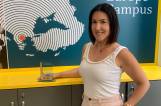
Dr Vicky Papachristou receives award for her presentation at the University of York Annual Learning and Teaching Conference
We are extremely happy to announce that Dr Vicky Papachristou, Assistant Professor in the English Studies Department, received the Poster Session Runner-up award for her presentation at the 2021 Annual Learning and Teaching Conference "The Changing University", organised by the University of York on Friday, July 2nd 2021. The award was made by the University of York Learning and Teaching Forum Committee. More specifically, Dr Vicky Papachristou delivered a poster presentation through a screencast titled "Reconnecting with society: The Public Engagement Scheme", which focused on the Equality, Diversity and Inclusion values that educational institutions have started adopting in Europe, showcasing the turning point for change. Drawing on the notion of Service Learning, Dr Papachristou demonstrated how civic engagement has been promoted and successfully implemented in the “Practice in English Language Teaching” Stage-3 module and curriculum of the English Studies Department at CITY College, University of York Europe Campus, by designing and offering language lessons to learners coming from financially vulnerable groups. As the aforementioned module combines public engagement with credit award and employability, teacher-trainees are engaged with real teaching of English in a foreign language context applying the knowledge they have acquired throughout their studies. At the same time, teacher-trainees are assessed via portfolios and observed teaching. What is of pivotal importance is that teacher-trainees offer back to society by teaching learners who come from financially weak social groups and who otherwise would not have the means to learn English. We would like to congratulate Dr Papachristou on the award and the great work she has done in organising and supervising the Public Engagement Scheme.
03/09/2021
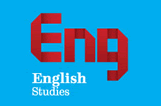
ESD students participate in subtitling internship in the context of the Thessaloniki International Short Film Festival
The English Studies Department of CITY College, University of York Europe Campus is happy to announce a collaboration which has taken place between our department and the Thessaloniki International Short Film Festival. Current students and alumni of our MA in Translation and Interpreting are currently engaged in an internship which involves the subtitling of forty films which will feature in the upcoming festival this Fall. Under the supervision of Dr Kelly Pasmatzi, Assistant Professor at the English Studies Department, our current and former students have been given the opportunity to practise and sharpen some of the skills they acquired through our programme within the context of one of the most important short film festivals in Europe. We would like to thank all of them for exhibiting extreme professionalism and excellent skills and know-how. Congratulations for their contribution to Michaella Gerogioka, Theofilos Gkarmpounis, Maria Liakatou, Stella Papachristou, Antonia Theodoridou and Maria Varouta!
07/07/2021

The English Studies Department Learns How to Build Narratives and Structure Stories
Where would we be without stories? We live life, reflect on it, escape from it, engage with it through narratives…oral, written, audiovisual as well as digital. On Wednesday, 12th May 2021, the English Studies Department’s last spring semester Personal and Professional Development seminar focused on exactly that. Dr Richard Steadman-Jones, Senior Lecturer of the School of English at the University of Sheffield, delivered an intriguing presentation titled: “Building Digital Narratives: Stories and Structures” that raised awareness towards yet another way to engage with and create narratives, namely hypertexts. What are hypertexts, one might ask? Think of Wikipedia! Hypertexts consist of chunks of text that are linked together in complex ways that can result in reading them in a different order, potentially resulting in a different story, what some may call a “branching narrative.” Some similar examples are text-based games such as Zork or an audiovisual example is from the BBC TV series Black Mirror, specifically the Bandersnatch episode. The big question is if one can tell a story utilizing this type of structure. The answer is, of course! Dr Steadman-Jones shared various student produced hypertexts as examples and brought other such texts to our attention, such as the Choose your own Adventure print book series. As Dr Steadman-Jones informs, hypertext stories can adopt different types of structures that lead to different story and reading experiences. There is the linear structure that resembles how we would read a print novel or short story. There is the hierarchical structure that provides us with options that branch off the landing or home page of the story, and what one chooses determines the progress of the plot. In some cases, we may come across a combination of linear and hierarchical structures. Of course, an element of randomness may be added such as rolling a dice to determine a choice. There are also the flat or weblike structures where the chunks of text of linked in a dense network where all chunks are or can be interrelated and lead into and away from each other in very intriguing and complex ways. An example Dr Steadman-Jones brought forth was Edward Falco’s Charmin’ Cleary. Dr Steadman-Jones further noted how even minute details such as colors, fonts, italics can be significant hints or clues that can reveal information about characters, setting or the plot. Depending on what one may choose, the focalization or point-of-view of the story may change, thus giving another character’s version of the events. The links in hypertexts carry heavy weight as they guide the reader, provide routes one can follow, but they can also subvert expectations. Links can be abstract items thus again pointing at something random or arbitrary in terms of path choice. Then again, they may be invisible thus prompting kinesthetic engagement with the text by having to explore our screen to find the link. Additionally, the order of the information is quite important as the same information but in different order can infer different stories. Or better yet, one text (and depending on the order and structure one adopts) can lead to endless stories. Dr Steadman-Jones also demonstrated a very helpful, free, and accessible tool one can use to create hypertext narratives. Twine can be downloaded to one’s computer or used online. It enables one to create chunks of text, establish links, insert images, and create a simple linear hypertext or have a go at something more complex. AI Dungeon is a similar type of tool. All in all, the area of digital narratives and hypertexts is rich as it brings together narrative, digital media, and technology. It combines storytelling, software tools and coding. It can be inspired by areas such as gaming either at a cognitive level, material level, physical level or even be taken into account when considering various debates such as the narratology versus ludology debate or current practices, such as transmedia storytelling. What is more, it reveals new author/creator storytelling practices, new reading experiences and well as different digital literacy skills. For those interested in areas such as linguistics, literature, media, this is not an area to be overlooked!
17/05/2021
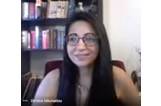
The English Studies Department Explores how to Research Fantasy Worlds and Speculative Fiction
Think of a world…any world…imaginary…slightly imaginary…do you just read about it…talk about it…live in it…? This is what the ESD was called upon to initially consider in the seminar that took place on Wednesday 14th April titled: “Fantastical Worlds and How to Study them: Conducting Academic Research on Speculative Fiction Worldbuilding.” Ms Dimitra Nikolaidou offers her insights, knowledge, and expertise on a rich, entertaining even escapist area, but also one that has begun receiving more attention from academia. Ms Nikolaidou primarily informs of the vastness of worldbuilding, how the term has been applied so broadly that it is difficult to utilize in critical discussions. There are also some noted misunderstandings, for instance, worldbuilding is not to be confused with setting. Instead, worldbuilding involves studying the ways in which authors/creators conjure worlds but also how we as readers or viewers or even gamers perceive those worlds. Drawing on multiple examples from Dune, to Tolkien, to World of Warcraft, to Dungeons and Dragons to Flash Gordon, Ms Nikolaidou raises our awareness towards the fact that certain genres like fantasy, horror and science fiction were not taken seriously and were not considered acceptable topic areas for academic research. Fortunately, for all us avid fans out there, various reasons - either works receiving acclaims, becoming mainstream through adaptation or transmedia treatment, or the academic turn towards such genres and types of story worlds - these genres began receiving more serious scholarly attention. Thus, great opportunities were given to readers, writers, creators, fans as well as scholars and academics to explore these rich and fantastic worlds. Of course, as Ms Nikolaidou explains, when it comes to academic research there are certain requirements: one must have read/viewed/played the respective text (and other similar ones), be familiar with certain traditional core theories, be familiar with the genre of the work, the medium of the work as well as tools and methodologies. While all this appears overwhelming, Ms Nikolaidou offers some guidelines that can assist in narrowing down certain items and becoming more selective. Aspects to consider include whether the world under examination is primary or secondary, the mode of worldbuilding (authorial, reader or critical worldbuilding) should also be taken into consideration as it can narrow and determine our approach as well as theoretical choices and tools we choose to utilize, and the actual fantasy world – as a whole, but also its parts and how they are structured. Ms Nikolaidou presents certain categorizations that have been proffered by scholars to assist in how one approaches texts and the worlds in them. For instance, Ms Nikolaidou referred to Farah Mendlesohn’s 4 categories: portal/quest fantasy, immersive fantasy, intrusive fantasy, and liminal fantasy where each world has a different goal in service to the story. Whilst indicating certain challenges regarding the Authorial or Reader approach, Ms Nikolaidou focused more on the Critical Worldbuilding mode and drawing on Ekman and Taylor suggested two potential approaches one can utilize: the Architectural approach where emphasis is placed on the function of the place, the form and the meaning it generates as well as the idea(s) this conjured world represents, while the second is that of Dynamic Interplay an approach that takes into account the interrelationship of aspects within the world and even outside the world. All in all, whether one is a writer, reader, or scholar, one can find unique, insightful, and fruitful ways to examine worldbuilding, contribute ideas, approaches, and concepts towards its impact across various disciplines and if one thing is certain it is that if a picture is worth a thousand words, imagine how many things we could say, discuss, write, and debate about worldbuilding!
19/04/2021
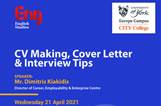
Seminar on CV Making, Cover Letter & Interview Tips
Wednesday 21 April 2021
14/04/2021
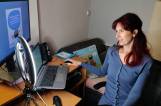
The English Studies Department and ELT Teaching for a Cause
Teaching is a noble profession but many times we forget how it is also a calling and a platform through which one teaches knowledge and skills but also instills values and raises awareness towards significant issues. On Tuesday, 10th March 2021, the English Studies Department became aware of stray animals and how they can inspire the creation of ELT teaching material, motivate the learning process, instill sensitivities, and ignite creative activism towards noteworthy causes. Raising our awareness of the above was guest speaker, educator, teacher trainer, materials writer and children’s author storyteller, Ms Margarita Kosior who delivered a seminar titled: “ELT for Companion Animals: Teaching for a Cause”. Ms Kosior is an avid animal rights supporter, who also takes in stray animals, makes them a part of her family, raises awareness towards the issues involving stray animals, volunteers at the animal shelter Stray Planet in Thessaloniki and now has used her love for animals as creative content and materials inspiration for ELT teaching. In her seminar, Ms Kosior offers the background context and motivation that resulted in this prosperous project, by primarily drawing the connection between animal cruelty and abusive behavior in general and how the former can be a tell-tale sign. Of course, being educated on the matter can help us resolve certain parameters and be a voice that helps to change and solve the situation. And, of course, stories also have a strong resonance and impact on raising awareness towards significant causes. Ms Kosior offered a comprehensive overview of the Tales of Strays campaign as well as her story/material contribution titled “Toby to the Rescue.” The campaign and all relevant materials, both online and printable, can be accessed at the following website: www.margaritakosior.com Material for young and adolescent learners can be found in abundance, complete with lesson plans, teacher instructions and a variety of activities ranging from memory games, to word searches, to rhyme time to jigsaw puzzles telling the stories of actual stray animals to engage learners and educate them not only in the English Language but towards the cause of helping and loving stray and companion animals. As the stories that pose the focal point of each lesson are also inspired by real life, they further demonstrate the passion the contributing teachers and material creators have towards the cause. The website also contains the marvelous creations of students demonstrating not only their knowledge in English but their creativity in poems, story-writing even illustrations. Teacher contributions are also included to act as examples and inspiration for other interested parties but also to raise awareness. Many organizations and individuals have expressed their support towards the Tales of Strays campaign and Ms Kosior graciously extended an invitation to anyone who is interested in contributing ideas, lesson plans and supporting the cause. The cause is also active on social media platforms including Facebook and Instagram. On a closing note, if the desire to teach and learn is on its own noteworthy, let us consider how much more impactful it can be when it is inspired by a cause meant to make us more empathetic and loving not only towards animals but towards all people and creations.
17/03/2021
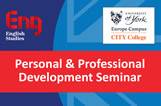
Personal & Professional Development Webinars 2021 by our English Studies Dept.
March - April - May 2021 Join and share! Online Participation Form Join the Webinar Ready to join? - Join via your mobile device, laptop or PC - Enter the event 10' earlier by clicking on the 'Join' button (you will be requested to enter your email to join in) - Make sure that you have your camera and microphone turned off - Make sure you PIN the presenter's image so you can have a full screen view. Join the Webinar
02/03/2021

The English Studies Department Examines the Nature and Significance of Online Teaching
“It is the supreme art of the teacher to awaken joy in creative expression and knowledge” Albert Einstein On Tuesday, 12th December 2020 the English Studies Department considered and exchanged ideas and information on a highly relevant topic accompanied by the mentality of Einstein’s quote above. Dr Vicky Papachristou delivered a seminar titled: “Online Teaching: When, Why, What and How” thus touching upon crucial concerns within the field of teaching and learning particularly given the current circumstances and the impact of Covid-19. Despite the challenges and difficulties, the overall mood was uplifted by the desire to bring interested parties together – both teachers and students – to share ideas, express concerns, and gain insights to the new developments in teaching and learning. Dr Papachristou primarily begins by providing definitions of distance education, noting that it actually began three centuries ago and first appeared in Greece in 1992. She then proceeds to demonstrate when online teaching is required such as in cases of long distances, professional development, work obligations or even a pandemic. She then indicates why it may be important and/or necessary to teach online and focuses our attention on the advantages and obstacles for both students and teachers. According to Dr Papachristou, generally anything can be taught, even in an online mode. The main question that should concern us is HOW. Initial aspects pertaining to how we teach involved the hardware and software equipment we have at our disposal. The next aspect to consider in relation to its advantages but also challenges is that of synchronous (live) or asynchronous teaching. Each one displaying pros and cons, Dr Papachristou informs that many studies have been and are still being conducted on such aspects of teaching and learning as more and more people are switching to an online teaching environment. Tools for both cases are provided with Dr Papachristou expanding the suggestions to applications (e.g., Kahoot, Quizlet, PlayPosit, Edpuzzle, etc.), whiteboards, digital platforms (e.g., zoom, WebEx, google meet, skype, etc.) whilst not overlooking the contributions of emails, blogs, social media as well as video and audio recordings. Certain parameters are taken into consideration regarding not just the implementation of online teaching but also the findings of studies focusing on different education levels in connection with online teaching. The data and the purpose of the research present positive attitudes in some cases towards online teaching, reveal challenges and obstacles that need to be tackled whilst also revealing figures that confirm that not everyone has the technological availability, accessibility, digital literacy, knowledge, and skills to handle, manage and navigate online teaching/learning situations, thus rendering seminars like this one even more relevant, helpful, and necessary. As Dr Papachristou further demonstrates, we additionally need to consider the local context in which we are operating alongside what is happening on a global level. We need to be aware of what limitations, shortcomings and local obstacles need to be overcome to adopt strategies and models that appear to be working effectively in other countries and contexts. Dr Papachristou also provides practical tips and strategies on how to handle various aspects of teaching and learning, ranging from but not limited to the digital platform, the syllabus, student grouping, interaction and engagement, authentic learning, methods of evaluation and assessment and shares some helpful, fun, and engaging ways to treat and tweak material to accommodate learners’ needs even online. Such examples include using photographs in combination with writing and/or speaking, using Twitter and tweets in connection with different subject matter, like history, and even utilizing podcasts and video sharing. The current circumstances and the respective challenges are undoubtably great, we are all subject to varying degrees of change but if we want to succeed and see each other through these difficulties, Dr Papachristou advises that we keep the following in mind: “We teach in a remarkable time. Each day you walk into your school, whether it be a classroom, office, or somewhere else, remember that you help to shape the future and what you do can change the world!” (Adam Bellow, Educator)
27/01/2021

Dr Papachristou delivers webinar for the International Information Technologies University, Almaty, Kazakhstan
On Wednesday, 25th November 2020, Dr Vicky Papachristou, Lecturer at the English Studies Department, delivered an interesting and insightful webinar in the framework of “English week” for the Languages Department of the International Information Technologies University, Almaty, Kazakhstan. In particular, Dr Papachristou was invited by Prof. Gulnara Zakirova, Director of International Programs of International Information Technologies University, Almaty, Kazakhstan and coordinator of ALLVET (Erasmus+ programme), to participate in a webinar titled “Learning outcomes and assessment”, which was organised by the Languages Department in the framework of “English week” and targeted teaching staff of the Department. During the webinar, Dr Papachristou discussed Bloom’s Taxonomy focusing considerably not only on the phrasing of accurate aims and learning outcomes but also on their successful alignment when constructing syllabi for various courses. Additionally, she highlighted the significance of alternative assessment emphasising the issue of its alignment with the learning outcomes, as well as the pedagogical implications emanating from offering students diverse types of assessment. In doing so, a number of examples were explored which gave the participants the chance to enrich and further consolidate their knowledge on the specific topic.
15/12/2020
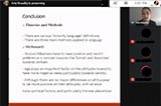
The English Studies Department Ponders Attitudes towards Minority Languages
An academic environment is not simply about the courses and programs, skills and seminars. It is also concerned with consulting and, better yet, conducting research. CITY College, and all its Departments, pride themselves on research-led teaching/learning as well as conducting quantitative and qualitative research. For the 3rd Personal and Professional Development Seminar, delivered today, Tuesday, 24th November 2020, the English Studies Department invited PhD candidate of The University of Sheffield, School of English, Ms Arta Mussolaj, to share both her PhD topic and research experience with fellow and soon-to-be researchers. The title of her seminar: The way you see my language: Conducting research on attitudes towards minority languages, demonstrates yet another topical and highly significant thematic area of research with implications across an array of disciplines Ms Mussolaj, primarily provides the definitions pertaining to minority languages as well as how attitudes towards languages (and potential speakers) are defined and understood via available literature. Upon delineating the topical area, Ms Mussolaj, presents the different types of research methods one can adopt in order to examine and research said topical areas, namely Direct, Indirect and Societal treatment approaches. The advantages and disadvantages are presented and Ms Mussolaj is clear in pointing out that the methodology highly depends on what best fits the aims of the research. Following this, Ms Mussolaj, provides an overview of the context of the country in which her research took place, that of Kosovo. With the assistance of visual aids, maps, and graphs, Ms Mussolaj demonstrates the various factors related to the context that had to be taken into account, ranging from the linguistic plurality, to the language policies, and community demographics. In addition, other aspects also had to be considered, such as the nature of the research and the methodology that she would ultimately adopt. In Ms Mussolaj’s case, her PhD dissertation adopts the Direct method (questionnaires and interviews). Upon formulating her Research Questions and Hypotheses, another vital aspect is the matter of participants and factors to consider in relation to them such as: age range, gender, the sample size and certain parameters that may create challenges such as how to recruit participants, or how the geographical factors play a role in the representativeness of the sample. Of course, in addition to the adhering to the ethical processes necessary to conduct such research, another challenging item was that of the questionnaire. Ms Mussolaj actually informs that a pilot questionnaire with a much smaller sample size assisted her in identifying potential oversights and problems that she could then amend before proceeding with the actual data collection. Regarding the data collection in itself, this turned out to be quite a massive sample, amounting to 1115 valid responses. What is more, Ms Mussolaj collected the data in person by visiting district areas in Kosovo and approaching potential participants in public spaces, participants who upon giving them consent (oral and in written form) enabled Ms Mussolaj to reach the statistical findings pertaining to attitudes towards minority languages in Kosovo, a quantitative study that as of yet, has not been conducted in this area. Ms Mussolaj shared both the positive and rewarding aspects of this experience but also the challenges she faced along with back-up ideas and suggestions as to how to manage and tackle them. Her research is ultimately insightful, intriguing and a valuable contribution to the scientific and academic areas of research. The implications of her research can benefit many disciplines, many scholars and many students. Her willingness to share her research journey is not only telling and admirable but also a reminder of how important it is for us to help researchers and contribute towards such research that can be quite revealing about people, languages, societies and cultures.
01/12/2020
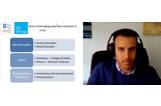
The English Studies Department Concurs with Building a Sense-of-Belonging
Have you ever wondered what can help us grow as individuals, build attachments, communicate effectively, form identities, manage loneliness and, overall, help us live longer? Insights to these areas and more were provided in the Personal and Professional Development Seminar series offered by the English Studies Department. The seminar delivered today, Tuesday, 3rd November 2020, by Academic Director of Undergraduate Programmes and Lecturer in the Psychology Department, CITY College, Dr Vassilis Chatzimpyros, provides insights to the above questions in the seminar titled: “Sense of belonging: Challenges in connecting within a cyber world”; a seminar that appears even more relevant and timely given the reality we have been and are currently facing. Drawing on scientific studies, Dr Chatzimpyros informs that longevity is observed and can be achieved via healthy instances of sense of belonging, in other words interpersonal relationships (family, friends, colleagues, etc) and group memberships that come to fulfill our basic need as humans, that of being social – amongst others – and that of interaction and communication. It is by establishing a sense of belonging that we build our identity, and we develop that identity through a sense of belonging. As humans, we may and can belong to various social groups that give us a sense of who we are, that offer support and act as a protection mechanism. In these groups, we form attachments on many different levels that also contribute to our sense of belonging. As Dr Chatzimpyros informs, a lack of sense of belonging can certainly result in feelings of loneliness, detachment and feeling disconnected. These feelings can further contribute to the development of stress, anxiety, depression, frustration and even helplessness. One should also be wary of instances of a fake idea of sense of belonging. The Internet and social media may have originally assisted in dispersing information and keeping people connected, but they can also contribute to this sense of detachment, feeling disconnected, lonely and may even prompt individuals to develop an identity clash. Dr Chatzimpyros emphasizes that if social media are used for two hours or more daily that can increase social anxiety, lower one’s self-esteem and increase chances of social isolation. This of course is not simply due to the overexposure we all have to the internet and social media given COVID-19 and the pandemic restrictions, but it ties back to developing an addiction to our online world and presence. Focusing on this, Dr Chatzimpyros highlights that there can be a clash between the real world and the online world that we as individuals and as group members experience. That clash is intensified if we consider fake realities, photoshopped images, misinformation, overload of information that does not allow us to critically examine and process the information that we come across. As a result, the online world can certainly be a place to establish a sense of belonging, particularly during times when real life social interaction is limited, but it can contribute to online addiction, loneliness, and hinder us from developing an actual and effective sense of belonging. In times of crisis we are more vulnerable on a mental, social, occupational, and even economic level. We are uncertain about the present and future, things are thrown out of balance. It takes courage to state that not everything is ok, that there are not only going to be “happy Instagram moments” and take a step back to re-evaluate our perspectives and consider our response to various situations and how we want to deal with and manage those situations. Sense-of-belonging, as Dr Chatzimpyros confirms, can be that protective factor we need that can be achieved if we: build meaningful connections, foster wellness, find purpose in what we do, embrace healthy thoughts and seek help. *In the spirit of establishing sense-of-belonging, CITY College not only offers its students the opportunity to join groups and expand their group memberships and attachments, it also offers opportunities for networking via seminars offered online and provides counselling services for those seeking help. More information
06/11/2020
  3 from 13 3 from 13   |
